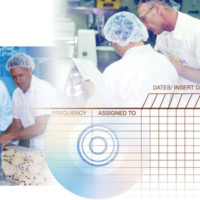Early in my food manufacturing sanitation career, I convinced myself that high sanitation department turnover was to be expected. I thought that all sanitation departments suffered from this. On the surface, there seems to be a lot of justification for the high turnover. After all, these sanitation jobs are entry-level positions, on the night shift, and for the lowest pay. The work is hot, wet, dirty, and physically demanding. It’s just hard to find good people, right? This article is meant to be a lighthearted, retrospective look at my early sanitation career mistakes that contributed to, or actually caused, the high turnover.
Excessive sanitation department turnover is hard on everybody. It creates a burden on the sanitation operation, which I consider the front line of defense for food safety and quality. It manifests itself by creating excessive recruiting and training costs, variability in cleaning outcomes, damaged equipment, late start-ups, low morale, and possibly even employee safety issues. Left unchecked, it can lead to quality issues, excessive waste, product that is out of specifications, foreign material contamination, product destruction, and worse.
Why is there so much turnover? Long before coming to work for Nestlé, I discovered that the excuses I thought were true didn’t really make any sense. Consider this: A person applies for a sanitation position with a company, goes through the interviews, takes and passes a physical exam, accepts the position, resigns from their old position, says goodbye to their colleagues, and boldly faces the first-day jitters on the new job. All of these activities are intentional. New employees fully understand what they’ll be doing, what hours they’ll be working, and what the pay rate is. They not only accept the position, but in most cases, they also are quite excited about it. Then, just a short time later, these same people can’t wait to get out of the department or the company. What changed?
I’ve learned that, oftentimes, the change has little to do with them. I believe it is quite often the reaction to well-meaning managers unknowingly sending the wrong message about sanitation. Unintentionally, management can make sanitation associates think:
• Their work and opinion are not important or appreciated.
• Getting done on time is all that matters.
• Cases of product out the door trumps everything else.
• Sanitation doesn’t generate revenue and is a “necessary evil.”
• Sanitation work is easy and takes little or no skill whatsoever.
In my early career as a factory sanitation manager, I made every mistake known to man and invented a few new ones that were named after me. This miscalculation, I suspect, is somewhat common in the food industry, and I firmly believe it is the root cause of excessive sanitation team turnover.
Please consider the messages you send in your conversations with your sanitation team members, who are so important to your operations. I’ve formatted a list into what I said, what I was thinking, and what they heard, and then I suggest a better message. So, here’s my attempt at a top 10 list of reasons why I couldn’t keep sanitation people:
1. What I said: “Hurry up! Production will be coming in soon!”
What I was thinking: “I am such a great motivator.”
What they heard: “The more important people are coming in, and they have more important things to do.”
A better message: “We will not release the equipment to production until it meets our standards.”
2. What I said: “Production is running late, but we need to still finish on time.”
What I was thinking: “Great managers like me stick to the key priorities.”
What they heard: “Nothing, including well-cleaned equipment, is as important as on-time start-ups.”
A better message: “You’re the expert. Tell me what you need for us to have an on-time start-up without compromising our standards.”
3. What I said: “That’s good enough for today.”
What I was thinking: “I’m an expert at risk analysis, prioritizing, and time management.”
What they heard: “My standards for cleaning are a moving target and vary based on convenience and whim. Pride in your work is optional.”
A better message: “We take pride in not compromising our standards.”
4. What I said: “We don’t have enough people or time to train you further, so just do your best.”
What I was thinking: “I’m dealing with bigger problems here and can only do so much. We’ll call this a trial by fire. I trust you to step up to the challenge.”
What they heard: “Cleaning isn’t all that hard. It’s not really that important, and I’m not worried about it.”
A better message: “This work is really important. You must be fully trained so that you can safely complete the procedure and meet our standards. Let me know if you have any questions.”
5. What I said: “Make sure it looks good when QA comes around; otherwise, they’ll make you reclean it.”
What I was thinking: “I’m actively protecting our team’s reputation.”
What they heard: “QA are the folks with the high standards, and they’re the bad guys. It’s OK to do as little as possible and hope they don’t catch us.”
A better message: “Because we consistently clean to our standards, QA rarely needs us to reclean. When you meet our standards, QA is our biggest fan.”
6. What I said: “This piece of equipment was damaged, and I have to give you a write-up that goes in your file.”
What I was thinking: “Look at me holding people accountable.”
What they heard: “We’re always looking for reasons to write people up and get rid of them. You’re easily replaced.”
A better message: “We’re glad you weren’t hurt when this happened. You’re the expert at cleaning this equipment, so what part of the equipment or procedure failed and allowed this damage to happen?”
7. What I said: “The last person on this job could get it done on time.”
What I was thinking: “I’m motivating you by using a spirit of competition.”
What they heard: “Getting it done fast is better than getting it done well.”
A better message: “What part of the equipment condition or the cleaning procedure can change to make it more efficient?”
8. What I said: “You’ve been here longer than that other person. I expect you to get the equipment cleaner.”
What I was thinking: “I’m recognizing your expertise.”
What they heard: “I have different standards and expectations for different people. I show favoritism.”
A better message: “You can get the job done faster than anyone else because you’ve been doing it longer and you’re our resident expert. No matter who does the job, however, our standards must be met for the equipment to be released.”
9. What I said: “We had two people call in sick and we don’t have any replacements. We’ll have to cover their jobs and still start up on time.”
What I was thinking: “I’m really good at being transparent and setting expectations.”
What they heard: “I can’t manage my operation and don’t have a set standard for cleanliness.”
A better message: “What is the best way for us to reduce the delay in our start-up without compromising our standards?”
10. What I said: “We had a positive from our environmental pathogen monitoring program; therefore, we need to do a better job of cleaning.”
What I was thinking: “I’m really good at root-cause analysis and driving corrective actions.”
What they heard: “Positives are obviously a cleaning issue, and it’s always going to be sanitation’s fault when we find it.”
A better message: “You’re the expert on this equipment and cleaning process. You’ve been trained on environmental monitoring, so we need your help to find the root cause of the positive.”
Be smarter than I was in my early career. Recognize the expertise of your sanitation team members. They likely know more about their area and equipment than you do. The team members need recognition when they consistently meet and exceed our uncompromised cleaning standards, not simply when they finish on time. It’s about successfully following a process and taking pride in meeting the standards. We must consistently and deliberately send the message of why the work of the sanitation group is so important. When sanitation is done right, team members are much less likely to leave the department or the company!
Duane Grassmann is a corporate hygienist, Nestlé USA & Canada.
The Top 10 Reasons Why I Couldn’t Keep Sanitation People



